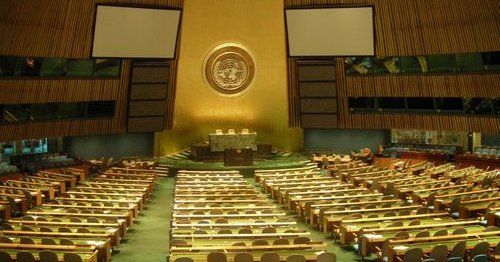To demand for a world governance is not that eccentric. The General Assembly of the United Nations is already there to reach that objective but with its intergovermental logic just reproduce, worse, all the mistakes of the Council of the European Union. As Gérard Onesta reminds us, a General Assembly where Monaco and China have the same weight, does not reflect neither the image nor the power of the nations, and this imbalance is what justifies the existence of the Security Council whose right of veto has been blocking the international politics for decades.
In order to pass this archaic logic, voices have raised to demand for a Parliamentary Assembly of the United Nations, with other words the World Parliament in which the countries would get their sieges proportionally according to the size of the population. So the balance between the global forces would be able to find a better representation, and this new assembly would be able to establish a worldwide public area by letting the deputies to form groups by their political ideas and beyond their nationality. We know already the role of a comparable institution, the European Parliament, and its function in the construction of the political Europe.
Which initial competences for the World Parliament?
A World Parliament would enable to exceed the blockings and the lack of democratic legitimacy of the United Nations. It would create an area for the dialogue and for the consensus that neither the General Assembly nor the Security Council are able to provide. Such a Parliament, with defined basic competences could get progressively influence and could extend its authority to decide, while encouraging the election of the deputies by direct universal suffrage and the construction of a global democracy.
The European Parliament has emerged in the margin of the European Coal and Steal Community. So consequently we can ligitimately ask ourselves which will be the concrete foundations of a World Parliament. Which challenges would demand, more than the others, a global governance? The question of the initial competences is important, as it is going to determine the viability and the credibility of this new institution. Among the different roles who might be assigned to the Parliament and among the different domains in which it could legislate, we can mainly imagine these ones:
Management of the Specialized Institutions of the United Nations. The World Parliament could have in first place the right to take part in the codesision procedure and in the management of different agencies linked to the United Nations. In this way the Parliament could participate in the management of the International Monetary Fund so as of the World Food Program, and also in the World Health Organization for instance.
The environment and the sustainable development. The environmental challenges are by nature planetary and complex, and the intergovernmental approach has already showed its limits. The international treaties like the Kyoto protocol do not seem effective enough concerning the extern of the challenge. The World Parliament could be the sufficient place to launch politics concerning the protection and the essential developments to preserve the ecological balance in long term.
And why not the Internet? The informatical networks are having a growing importance in the global level and become vital concerning the development of our societies. Though the control of the system is still centralized by one country: the United States of America. Sooner or later, the question of the democratic control of the Internet will arise certainly and an institution like the World Parliament could have the legitimacy to deal with the question.
This list is not exhaustive. The research, education, energy, trade, finance are also domains which could generate the World Parliament. Anyway, everything would depend on the priorities of the global political agenda in the moment when this institution would start to operate.
What role for the Supranational Unions?
However the World Parliament should not repeal the already realized progress in the big regions of the planet and above all in Europe. With other words, this new institution should nor decrease the importance of the already existing supranational Unions (European Union) nor prevent other regional unions to be built (Latin-American Union, African Union). If France, Germany, United Kingdom and other European States are sending individually their deputies to this new institution, the World Parliament would only confirm and strengthen the old logic of the Nations, and would make even more difficult the political integration at the European level.
To avoid this effect one simple rule could be set: “The World Parliament would receive deputies from Regional Unions or if it is not the case from Nations.” So therefore, no French, German or English deputies but European ones. For those we consider as regional Union after the criterias of the democracy and political integration, an organization like this seems to be justified. The planetary assembly, by receving the representatives from democratic entities from a higher level, means for the Regional Unions if these ones are existing, would guarantee a right articulation and a constructive relation between the national, regional and global levels of governance.
A World Parliament, which would operate the regional Unions and propose a place to a planetary debate would undoubtedly represent a fundamental progress compared to the actual system of the United Nations. But to make a step forward, first we should probably think over the initial competencies which could be allocated to the new institution.


1. On 13 October 2009 at 21:45, by ? Replying to: The World Parliament, successor of the European Parliament?
Replying to: The World Parliament, successor of the European Parliament?
If you support the idea of a World Parliament, there is a group called the Campaign for the Establishment of a United Nations Parliamentary Assembly.
Follow the comments: |
|
